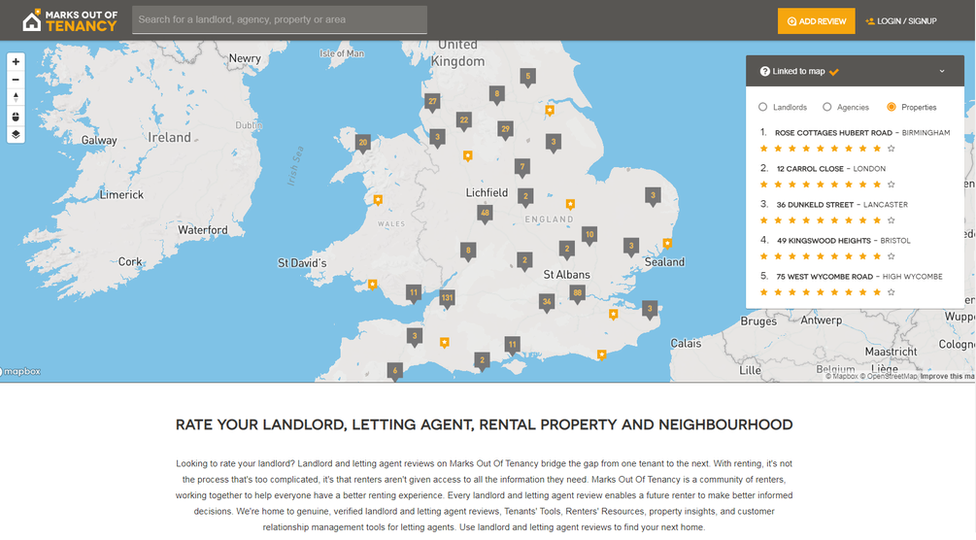The websites helping renters fight rogue landlords
- Published

Ben Yarrow founded Marks Out Of Tenancy in 2017
It was a dispute over a missing bed cover that sparked the idea for Marks Out Of Tenancy - a website that allows renters to rate their past landlords.
Founder Ben Yarrow was moving out of his flat when he received an email saying: "I'll be glad to see the back of you."
He had complained after his then girlfriend was forced to throw away hundreds of pounds worth of clothes that went mouldy because of a poorly-ventilated built-in wardrobe.
So the couple felt more than a little aggrieved when their landlord began quibbling over a missing £3 bed cover.
It was then that Ben tried to find a website where he could leave a review for his landlord.
While there were sites where people could complain about bad landlords, Ben felt there wasn't anything on offer that provided constructive feedback and useful information for tenants.
For that reason, he says his website is as much about promoting good landlords and letting agents as highlighting bad practice.
The review is also broken down into sections, allowing renters to rate their landlord, letting agent, property and neighbourhood to highlight the positive and negative aspects of their tenancy.
Reviewers can leave a rating out of ten as well as a comment on areas including value for money, quality of repairs and communication from the landlord and letting agent.
The primary aim, Ben says, is to help tenants make better-informed decisions.
"It's not that renting is difficult - we just don't have access to the right information," he adds.

Marks Out Of Tenancy has reviews of properties across the UK
Ben admits he has faced a backlash from some landlords, who fear they could be given an unfair review - but the idea has proved popular with renters.
Anna-Ruth Cockerham, a 19-year-old student at the University of St Andrews, decided to use Marks Out Of Tenancy after facing a host of problems with her landlord in the second year of her studies.
The house was "freezing cold" and had rats when she moved in, while she says the landlord was slow to deal with repairs.
"He just told us to tidy up and the rats would go away", she says, adding that the landlord only dealt with the issue when neighbours reported it to the council.
The heating problems were particularly difficult, Anna-Ruth says, because she suffers from joint pain caused by a neurological condition, which is made worse by extreme temperatures.
Being able to read a review of the house before signing the contract would have been invaluable, she says.
"If I had known in advance the house was freezing cold all the time I would not have chosen to live there," Anna-Ruth adds.
She later discovered the same issues had been reported by previous tenants but the landlord had failed to address them.
"The main problem is you never speak to the previous tenants so the landlords can do the same thing year after year but no-one ever picks up on it," she says.
"When you rent a house, you often only see it once and you're told you have to sign the papers within a couple of days or someone else will take it. So it can be difficult to find out what the landlord is like."
It was this that motivated her to leave a review of her landlord online - to make sure prospective tenants had access to this information.

Anna-Ruth Cockerham says review websites make renters aware of any issues with a house before they sign a contract
The assistant chief executive of student housing charity Unipol, Nicola Brown, says reviews are particularly helpful for young people, who have less renting experience and may not know what is acceptable practice.
The charity launched Rate Your Landlord, a review website for students in Leeds, in partnership with Leeds University Union in 2016.
Like Marks Out Of Tenancy, the site is not just about exposing bad practice - it also holds an annual awards ceremony to highlight good landlords.
"This site doesn't have value as a 'hate your landlord' website," Nicola says. "It has value in being something where people can be signposted towards the best landlords as well as seeing which are the worst."
Nevertheless, review websites have still provoked concern from some landlords.
David Smith, policy director for the Residential Landlords Association, warns "there is no real guarantee of who is posting, or whether their experiences are genuine".
Owen O'Neill, a landlord in Birmingham, is also wary about the risk of fake reviews.
"In principle I've got no problem with it," he says. "It's good to get customer feedback."
But he says landlords must be notified about any review so they can respond - and they need to be sure the reviewer was actually a tenant.
Ben stresses that Marks Out Of Tenancy encourages landlords and letting agents to reply to reviews, which are moderated for potentially defamatory content and to check the tenant lived in the property.
Rate Your Landlord also verifies and moderates reviews before giving landlords the chance to respond ahead of publication.

Sue Michaels (second left) won an award from Rate Your Landlord after being rated highly on the site
Nicola says some landlords now recognise the site as a useful marketing tool.
Sue Michaels, a student landlord in Leeds, says she is often contacted by potential tenants who have found her on Rate Your Landlord. She also feels the site is important for pushing up standards across the sector.
"How can we improve things unless the bad landlords and agents are highlighted?" she adds.
One of the limitations of sites like Marks Out Of Tenancy is the number of reviews available - it has had 850 since it began in 2017.
However, with similar websites popping up across the UK, the demand for such information appears to be growing. Rate Your Landlord currently has more than 3,600 reviews in Leeds and a target of 1,000 new reviews every year.
Ben also wants to see his website grow.
"More people need to know about this if we are going to take any steps to making renting better," he says.
- Published5 August 2019

- Published13 March 2019

- Published19 February 2018

- Published15 April 2019
